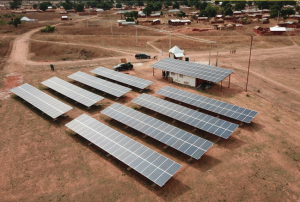Stakeholders in the renewable energy sector have called for a sustainable financing model for the attainment of Nigeria’s Energy Transition Programmes (ETP).

The stakeholders made the call in Abuja on Tuesday, October 15, 2024, at a stakeholders’ engagement on the nation’s energy transition programme.
They were of the view that financing, especially private sector finance mobilisation, was key to the execution of ETP programmes in the country.
The programme, with the theme: “Maximising Just Energy Transition Opportunities through an Inclusive Country Platform”, was organised by the Yar’Adua Foundation.
Mr. Patrick Okigbo of Nextier Advisory Energy Transition Limited, an energy transition advocate, called for a funding model that would be sustainable.
Okigbo said the country could adopt a model similar to the petroleum development funding model, where funds from petroleum proceeds would be dedicated to drive ETP.
He said that sustainable financing could only be attained with the support of the private sector as government alone could not totally fund ETP.
“There should be a clear financial and comprehensive plan to attract private financing,” he said.
According to him, energy security should be considered as very critical to national security in the country.
Okigbo said efforts should be made to place people and communities at the centre of ETP.
“To achieve energy transition in Nigeria, we must place the people and communities at the heart of every activity and discussion of energy transition programmes, engaging them to understand their needs.
“We must also create a community-based ETP strategy to address negative impacts on ETP.
“We need to strengthen government commitment and leadership on ETP, with strong political will, more commitment, more action and less talks,” he said.
Okigbo also stated that government must work toward addressing the micro-economic uncertainties and infrastructure challenges, while ensuring provision of infrastructure for renewable energy development.
“We must drive stakeholders’ collaboration to minimise resistance and foster trust,” he said.
Also speaking, Mr. Olumide Onitekun, of African Policy Research Institute (APRI), advocated for the use of just energy transition for ETP in Nigeria.
According to him, just energy transition is all about defunding fossil fuels in a way that reduces inequality, while prioritising economic, racial, and gender justice.
He, however, said that the plan required political will, private sector collaboration and programmed funding approach.
Earlier, the Director, Partnership and Development for Yar’Adua Foundation, Mr. Amara Nwankpa, said the ETP, though ambitious, did not align with the least cost pathway to total electrification.
He said there was the need to envision a different future where renewable energy would drive economic growth, job creation and expanded energy access.
The high point of the event was a panel discussion session on ensuring an inclusive and equitable energy transition opportunities and challenges.
There were presentations of stakeholders’ commitments on next steps in the energy transition programmes in Nigeria.
By Kingsley Okoye
